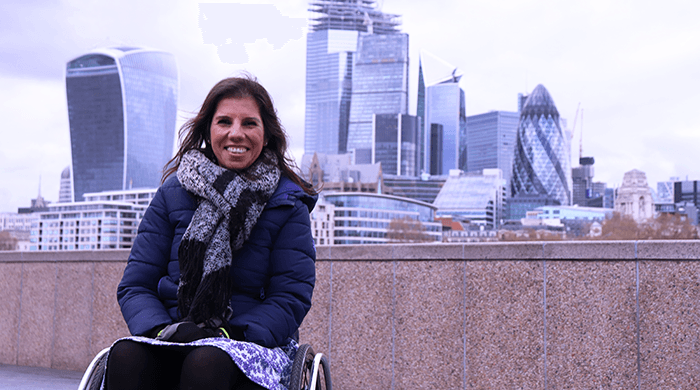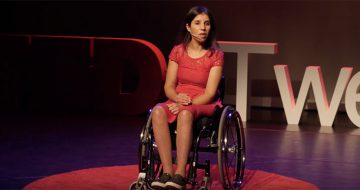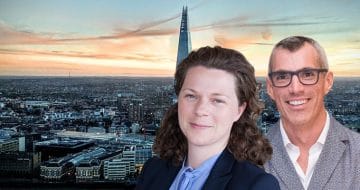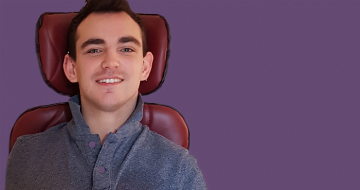Yasmin Sheikh on her transition from City lawyer to diversity advocate

Wheelchair-user Yasmin Sheikh is asked the same questions five to six times a day: ‘Are you okay? Are you on your own? Do you need help?’ For Sheikh, these questions, however innocuous they may seem, exemplify subtle microaggressions that disabled people face on a daily basis. “They’re a way of reminding me of how different I am, but this is my new normal,” Sheikh tells me when we met in a Central London café ahead of her appearance at Legal Cheek’s Future of Legal Education and Training Conference 2019. Underlying these comments is a “soft bigotry of lower expectations”, degrading wheelchair-users into objects of charity and pity. The former City lawyer continues:
“Let that person get on with it. They’re just living their normal lives. If they need assistance, they will ask for it. For example, sometimes I need help reaching something off the top shelf — but that’s me asserting my own independence on my own terms. When you lose the use of your legs, you fight for what you can do yourself.”
Such microaggressions have been commonplace in the 11 years since Sheikh, who at the age of 29, sustained a rare spinal stroke injury that suddenly led to her losing the use of both legs. When, after a year in rehabilitation, she returned to work as a personal injury lawyer, Sheikh recalls being confronted with attitudinal barriers.
“I found that after the injury, people had lower expectations of those with visible disabilities. People went from asking, ‘What do you do?’ to ‘Do you work?’… I found people were almost surprised that I went back to work in the first place,” she explains.
Sheikh reveals how blatant prejudicial incidents, known as macroaggressions, slowly chipped away at her confidence. For example, she recalls her then boss telling her: “If I employed everyone in the office with your disability, the business would collapse. I’ve got the same problem with part-time women workers.”
These attitudes can, in part, be attributed to how disability is viewed in a mainly ableist society. “I realised when people are talking about diversity and inclusion, they aren’t talking about disability,” says Sheikh. She found this revelation surprising considering that disabled people compose the largest minority group in the world. Driven to put disability onto the mainstream diversity agenda, Sheikh left legal practice to pursue this new sense of purpose. “This massive life event forced me to ask difficult questions about what I wanted. In many ways, this is the worst thing yet best thing to happen to me,” she reflects.
In 2015, Sheikh founded Diverse Matters, a training consultancy firm that uses workshops, tailored seminars and interactive events to give confidence to those with disabilities and support organisations striving to be more inclusive. The business, which Sheikh hopes to eventually take global, partners with a number of City law firms.
Sheikh explains that in order to build an inclusive culture, law firms must master the four B’s: business, bias, behaviour and belonging. The first element involves stressing the business incentive for putting diversity on the agenda. Barriers preventing access for disabled people means there’s an underutilised pool of talent, which if tapped into, could yield greater profits for the firm, according to Sheikh. Law firms must also eradicate institutionalised unconscious biases, she explains, such as those found in recruitment practices that indirectly discriminate against people with disabilities during the application process. As a result, Sheikh has found applicants with non-visible disabilities, such as dyslexia, are nervous about disclosing their health condition to potential employers. To eradicate bias, firms must first change their behaviour, especially those associated with micro and macro aggressions, with the aim of creating a safe space that is inclusive to all. Doing so will then achieve a sense of belonging, encouraging disabled people to bring their authentic selves to work, rather than spend valuable time and energy compartmentalising their lives. “Fitting in is a hollow substitute for belonging,” Sheikh stresses.
The real challenge to achieving industry-wide change is to convert those who are unmindful of the workplace barriers facing those with disabilities. Indeed, Sheikh admits to not fully understanding this bias and discrimination before her injury: “I was the first disabled person I’d ever met”. One way that Diverse Matters strives to overcome this is through the Wheelchair Challenge — an eye-opening initiative that involves senior leaders in organisations spending all day in a wheelchair. “These are people used to being noticed for the right reasons and not necessarily needing help, so there’s a feeling of vulnerability that they’re probably uncomfortable with,” Sheikh explains. The exercise is designed to give visibility to disability — raising awareness of the fact that every eight hours someone in the UK is paralysed by a spinal cord injury.
But how does being an entrepreneur compare to life as a lawyer? “I miss aspects of legal practice, but I will always be a lawyer — no one can take that away from me,” Sheikh says. If anything, having spent 12 years delivering legal services to clients has offered useful transferrable skills. After all, being an entrepreneur is about seeing a gap and providing a service to fill that gap. Lawyers must be able to negotiate and argue on behalf of their clients — presenting a convincing case for disability and inclusion is no different, she adds.
Also impacting Sheikh’s entrepreneurial outlook is her disability. Having to overcome complex challenges requires thinking outside the box — a skill which she applies when problem solving for her clients. Additionally, like many people living with disabilities, the greater threat of facing secondary health problems down the line puts into perspective what can be done now. She says:
“It forces you to think about your future more deeply because things can change very quickly. This happened to me overnight. As a result, there’s no time to waste. Now, I’m one of those people very impatient for things to change. You have to really get out there and hone that message to include disability on the diversity agenda.”
Yasmin Sheikh will be speaking during the morning session, ‘Embedding entrepreneurship into legal education and training’, at The Future of Legal Education and Training Conference 2019. First release tickets are available to purchase until midnight on Wednesday 17 April. General release tickets at full price will be available from 18 April.




